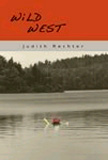 Review by Mary Meriam
Review by Mary Meriam
WILD WEST
by Judith Rechter
RAW ArT PRESS
ISBN 978-0-9729185-4-1
2007, 64 pp., $12.00
www.rawartpress.com
Life is a perilous balancing act. In a flash, the comforts we cling to can be stripped away. Judith Rechter’s book of poems, Wild West, is a wild ride through the perilous world. Animals and people are lost, fallen, chomped, bleeding, beaten, dead, skeletal. Several poems depict hair-raising rides in “the small world of the car” (Robert Bly), whether it be an actual car, or a bus, as in “Planetarium,” which I give you in full, and quickly, so that you can relish and be reassured by Rechter’s virtuosity as “the master-mistress of the absurd”:
Planetarium
Wow, I thought what guts. Was she serious?
We all sat on the bumpy bus grinding gears
as it lumbered like a wild beast pricked
with a metal hook just behind the ears.
The driver was in charge of her vehicle.
She was master-mistress of the absurd.
Sure Missus, we might drive over the railing.
Ok, I relaxed and watched a video
of what we might see up at the pinnacle,
the world spread out, flagged like a windy
banner consuming constellations and nebulae.
Our Milky Way reminded me of the enormous
space of things, earth tiny and to the left at the edge.
My grandson was mouthing the worry that the sun
might explode as we neared the top. His mom confessed
she had him on a new drug that made him
pee in his bed at night but maybe would help
him focus. I shook in disbelief.
I knew, she said, you wouldn’t approve.
Out the window, the sun setting, lights going on,
Capitol Tower decorated with a red Christmas tree,
I flashed on a cobra devouring a bunny.
Wow, we all had guts and I thought
that my comfort was in disrepair and we might
be going way over the edge like our bus
without brakes, and me, ballistic.
In this planetarium, the gutsy bus-driver is a goddess, holding the fates of her passengers with the steering wheel in her hands. While the bus-driver might be reckless, Rechter exercises masterful control of her poems. She is the “driver in charge of her vehicle,” and the source of her control and strength is her perspective of wit, wisdom, and delight, despite the perils in the world. It’s a pleasure to follow Rechter’s imagistic, emotional, and verbal leaps, because we’re safe in the world of Rechter’s poems.
In ancient times, in the “time of inspiration”, the poet
flew from one world to another, “riding on dragons”…
They dragged behind them long tails of dragonsmoke…
This dragonsmoke means that a leap has taken
place in the poem. (Robert Bly)
Rechter’s cinematic eye is always in play, as in these lines from “On Re-seeing a Monet Exhibit”:
You the fearless swimmer anxious to pull out the refracting
colors to see what no artist had grasped before. You
drag me from my insufficient skin from the crazy
patchwork yellows that fill my days.
Notice the conceptual convergence of “fearless swimmer anxious.” Again, a survivor of the perilous world keeps swimming, inspired by beauty, or goaded by the beast, to do even more than just survive, to “see what no artist had grasped before.” Then we are moved from visions of high art to the mundane world “On the Tarmac,” with these hilarious lines about the pompous side of po-biz, the business of poetry:
The national poetry workshops were still going on, poets
writing massive oeuvres as well as memoirs with ardour.
I was married to my laptop, working on an education poem
that was coming out bitterly.
Perhaps to signal her rebellion or queerness, Rechter occasionally opts for unusual grammar or spelling; in this case, she uses the British spelling of “ardour.” Rechter’s “education” poems are some of her best; she is a retired teacher of English and creative writing. In particular, “Class Picture on the Ramp” is a satirical portrait of class levels, visually explicit on a ramp, from the “cliff-like heights” to the lowest, latest immigrants. These lines show Rechter’s deft, encompassing, compassionate grasp of the profound dispossession caused by immigration:
It must have been a matter of rank.
I was stunned by the cliff-like heights
of the faculty and administrators
so self-assured, so uncompromising
big city coastal persons of oceangoing craft
whose forebears assume privilege and upheaval
having waded earliest through muck to shore.
Quite a late shoe I was from the middle ground
west and east of them, without profile, the flat rivers,
creeks and barnyard product of postmasters,
tailors, porters, cleaners, sewers, sowers,
who needed no place to stand.
The poet of Wild West, while acutely aware of the suffering in the world, gives us her courageous perspective, which is reassuring, despite her feelings to the contrary in these lines from “March”:
embedded information on the savageness of war
trudging up the hill I avoid a woman sitting on the curb
she’ll ask me for assurance I don’t possess
It’s one thing to crow about one’s compassion for the homeless, but it is perhaps more honest, and more heartbreaking, to admit your own helplessness and vulnerability on life’s wild ride.